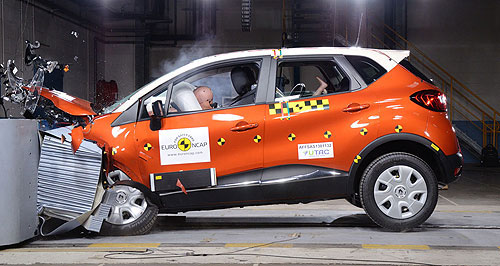News - General News - SafetyANCAP slams criticsWrecked: ANCAP is unhappy at the media coverage of its transitioning assessment program and is defending its local operations as essential. Leading global safety tester NCAP defends relevance of Australian branch1 Jun 2015 AUSTRALIA'S branch of the New Car Assessment Program (NCAP) has hit back at criticism from car-manufacturers and the media, describing its work as “immensely successful,” following negative coverage of the crash safety watchdog. While ANCAP does not refer to any specific criticism, the official release is likely to be in response to the skepticism of car-makers and some media outlets regarding recent changes to vehicle testing assessments and ratings. Last year, ANCAP announced it would gradually adopt the same testing processes as used by the European NCAP division, with a completed transition by 2018, while a new date-stamping system will make ratings easier for consumers to digest, according to the authority. But some mainstream Australian publications have described the changes to standards as either inadequate, misleading or confusing, joining the debate alongside displeased car-makers. In retaliation, ANCAP has struck back with an official statement, which expresses “disappointment” at the media's coverage, and says its work in Australia is “life-saving” and “vital.” In the statement, Global NCAP secretary general David Ward said the efforts of the Australian team are just as relevant as the other centres around the world. “Global NCAP is baffled by the recent negative comments made in the Australian media about ANCAP when, in fact, it has made a huge contribution to reducing road trauma at home in Australia and is also a strong partner with the other nine established NCAPs around the world,” he said. “ANCAP is a leader in vehicle safety advocacy and has been immensely successful in improving the safety of the Australasian fleet over the past two decades. Thanks to ANCAP and its simplicity of message, Australian consumers now consider safety as the primary factor when buying a new car. “ANCAP through its affiliation with Global NCAP has also assisted the development of new NCAPs in South East Asia and Latin America.” One such vehicle that has put the spotlight on shifting ANCAP standards is Renault's Captur compact SUV, which scored the maximum five-star rating when tested by European NCAP. Ordinarily, the vehicle would have forfeited one star when tested here due to a lack of rear curtain airbags, but with the changing system, it was awarded the full five stars, albeit with a 2013 'date-stamp'. Several publications jumped on the result, saying the inconsistencies highlight a flawed system that was not adequately educating consumers with accurate safety information. The result lead to further media speculation that Renault had deliberately delayed the arrival of its smallest SUV so it would be subject to the kinder standards, but the French car-maker explains the almost two-year lag behind the European launch as a result of manufacturing constraints. At the time, Renault Australia managing director Justin Hocevar said the credibility of European testing was greater than Australian assessment. “The testing regime of ENCAP I think is more substantial than that of ANCAP, they're testing a lot more vehicles, they’re testing all the Euro-made vehicles, and I think the relevance of that in the scheme of things is what matters,” he said. “We haven’t walked away from safety and we still have that five-star rating, you know… in fact it was the best score that’s been achieved in its class (in Europe).” Renault is not the only manufacturer to speak out about the findings of NCAP with Kia expressing “great shock” when its Carnival people-mover scored a four-star rating in ANCAP testing earlier this year. “It was definitely unexpected as all indications from internal data and the car’s excellent performance in the North American Highway Safety Institute’s testing, led us to believe there would be a five-star outcome,” it said in a statement. BMW has also previously weighed in on the debate, after its 2 Series Active Tourer and i3 scored four stars here but the maximum in Europe. “From a manufacturer’s viewpoint, the difference in criteria and changes of timing on these criteria is confusing,” said corporate communications general manager Lenore Fletcher. “If it is confusing for manufacturers, it must be confusing for consumers.” Mr Ward said that while Australian vehicles continue to have specifications unique to the region, the work of ANCAP would be necessary. “Unfortunately today new cars are still being sold that are specified differently for different markets with key safety technologies sometimes missing,” he said. “In unregulated emerging markets models are sold that would fail to meet even the minimum UN crash test standards. “NCAP’s are on the frontline of improved vehicle safety and without them the huge improvements in car safety seen over the last thirty years would not have happened.”  Read more |
Click to shareGeneral News articlesResearch General News Motor industry news |
















Facebook Twitter Instagram